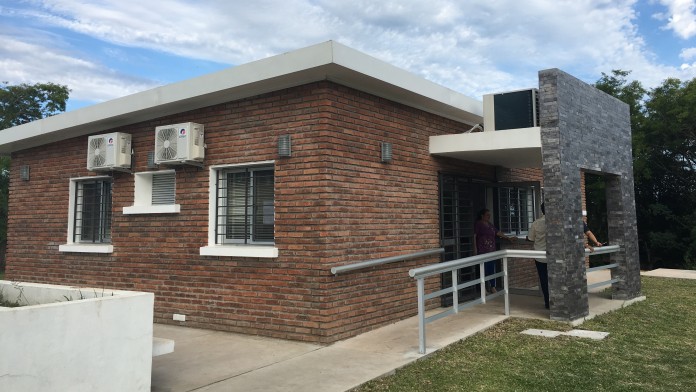News from 2018-02-21 / KfW Development Bank
Aids prevention beyond borders
First trilateral cooperation in Latin America: Brazil, Uruguay and Germany work together in the fight against immunodeficiency disease

Brazil, Uruguay and German development cooperation are working together in Latin America to improve HIV/AIDS prevention and treat people infected with the disease more successfully. This will be achieved by providing better health care in the border regions of Uruguay and Brazil. KfW Development Bank has financed the construction of ten rural medical centres in Uruguay with EUR 5 million on behalf of the Federal Ministry for Economic Cooperation and Development (BMZ).
At the same time, support was provided for training the medical staff by experts from neighbouring Brazil who shared their experiences in the fight against HIV/AIDS. "This trilateral cooperation is the first of its kind in Latin America," emphasises KfW Head of Division André Ahlert. In a world where the borders between traditional donor and recipient countries in emerging economies are becoming increasingly blurred, cooperation of this kind is forward-looking.
The ten new health stations, which have now been officially opened, are all located in the Brazilian-Uruguayan border region: nurses are on duty around the clock in buildings equipped with modern medical equipment. They attend to patients from both countries and provide them with medicine. Regular consultation hours are offered by midwives, gynaecologists, general practitioners and paediatricians. For the purpose of prevention, comprehensive information on the spread and infection paths of HIV/AIDS is distributed. Access to condoms is free of charge and anonymous at the stations. A nationwide standard database on HIV/AIDS cases was also created.
Brazil is sharing its experiences in the fight against HIV/AIDS
Experienced doctors from Brazil have trained the medical staff in Uruguay. Because Brazil successfully combated the spread of HIV/AIDS at an early stage, patients are being treated nationwide and information campaigns are working to counteract the stigma of those affected. Thanks to the trilateral cooperation, these positive experiences are now also being practiced more intensively in Uruguay. The provinces there are rural with low-income populations. Many migrant workers contribute to comparatively high infection rates with HIV. It is particularly in these poor regions that basic health care will now be improved, and the rate of HIV will be reduced.

Share page
To share the content of this page with your network, click on one of the icons below.
Note on data protection: When you share content, your personal data is transferred to the selected network.
Data protection
Alternatively, you can also copy the short link: https://www.kfw-entwicklungsbank.de/s/enzBWrMC.BvvA
Copy link Link copied